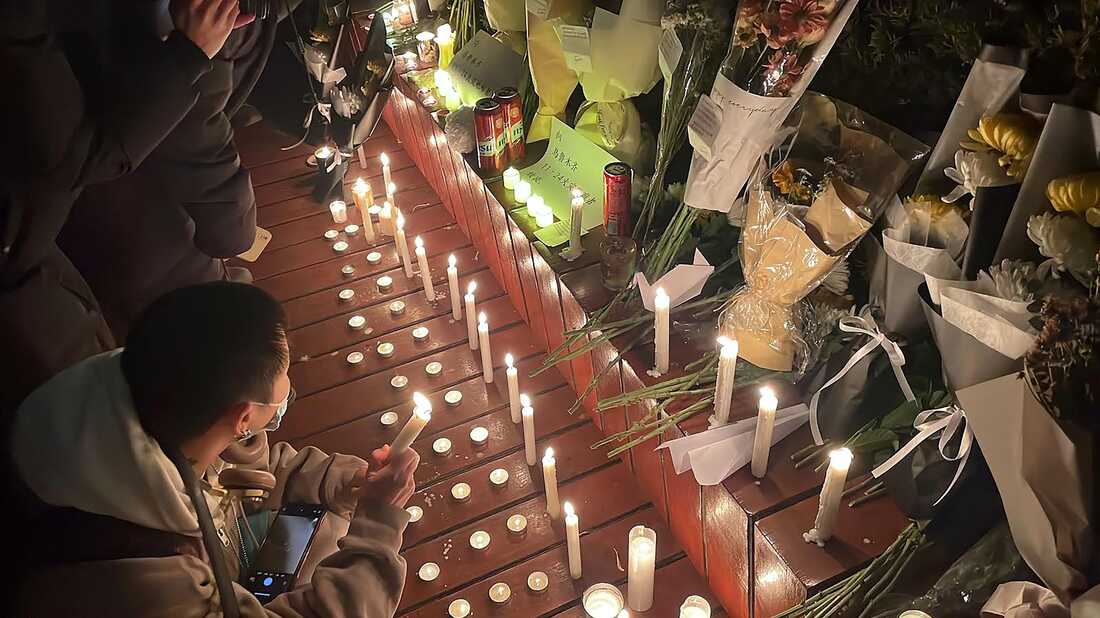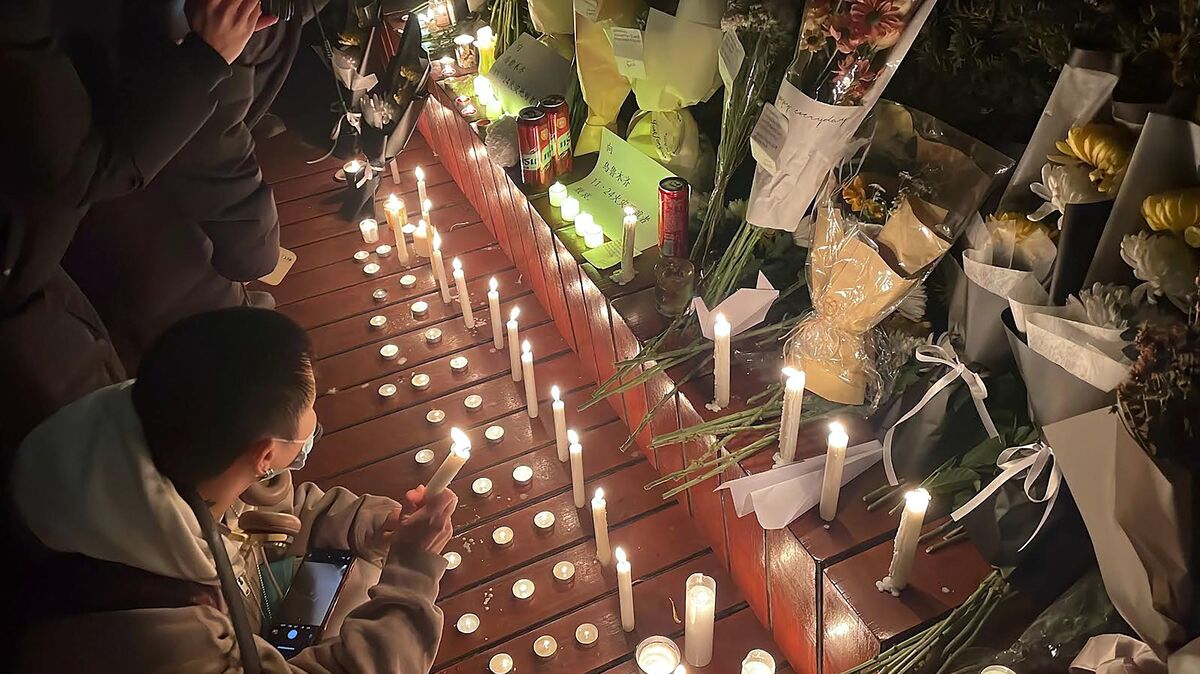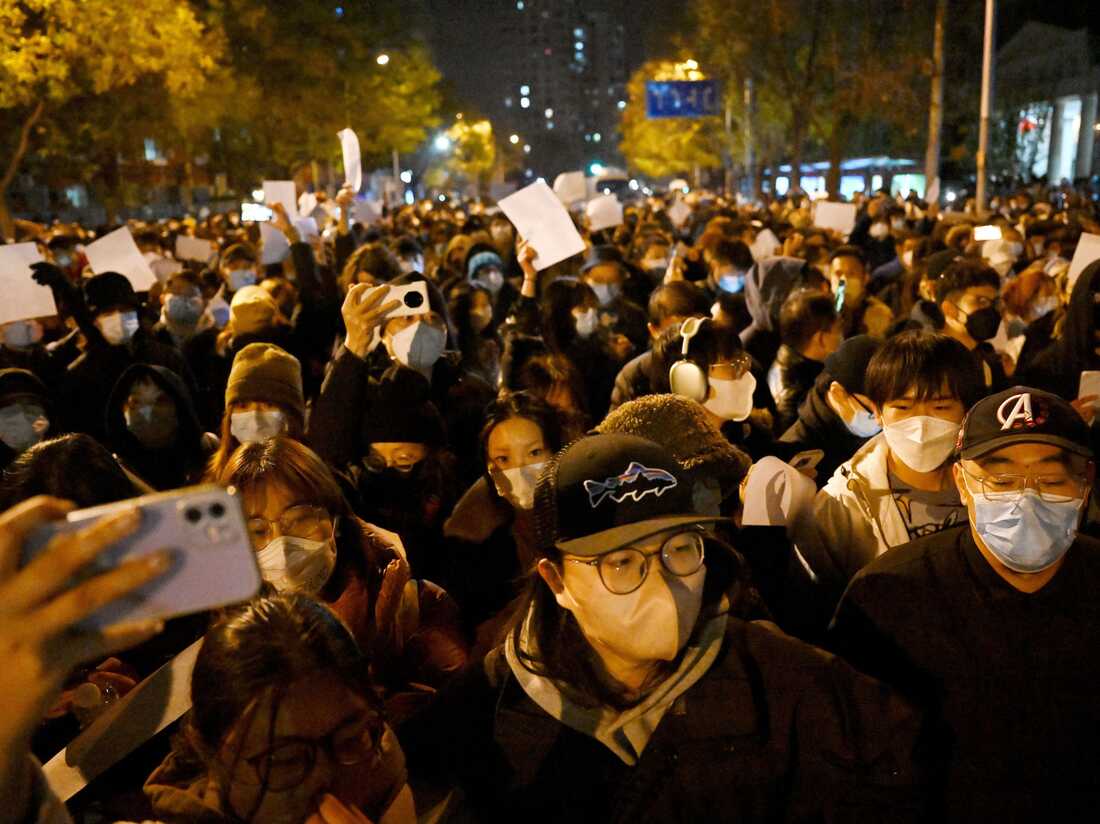How a deadly fire in Xinjiang prompted protests unseen in China in three decades

Protesters rallying against a COVID lockdown gather along a Beijing street where with candles are lit for the victims a deadly fire in the city of Urumqi.
Michael Zhang/AFP via Getty Images
hide caption
toggle caption
Michael Zhang/AFP via Getty Images

Protesters rallying against a COVID lockdown gather along a Beijing street where with candles are lit for the victims a deadly fire in the city of Urumqi.
Michael Zhang/AFP via Getty Images
Qemernisa Abdurahman had already survived a government crackdown that split up her family and endured more than 100 days in lockdown, when the apartment she shared with her four youngest children in the city of Urumqi caught fire last Friday.
The blaze took more than three hours to extinguish, according to authorities — largely because the building’s entrances had been blocked off and many of the doors locked, according to neighbors and witnesses. In the end, Abdurahman, 48, and her four children were among the 10 people killed in the fire.

Qemernisa Abdurahman and three of her children.
Abdurahman family photo/Abdulhafiz Maimaitimin
hide caption
toggle caption
Abdurahman family photo/Abdulhafiz Maimaitimin
“She dedicated her entire life to her children and their education,” said Abdulhafiz Maimaitimin, her nephew, from his home in Switzerland.
“If we die, let’s die together”
Anger over their deaths, combined with mounting frustration over the ongoing burden of China’s COVID-19 controls, boiled over this past weekend, coalescing in mass protests across dozens of China’s biggest cities in an extraordinary show of dissent against the country’s ruling Communist Party.
“If we die, let’s die together,” protesters can be heard shouting in several social media videos taken Saturday from the main town square in Urumqi, the capital of China’s western Xinjiang region, the night of the fire. Other demonstrators chanted “liberate the city” from lockdowns.
Xinjiang authorities held a press conference on Saturday saying they would lift lockdowns in low-risk neighborhoods where there were no active COVID-19 cases and relax restrictions “in stages” across the rest of the region. Much of Xinjiang has been under continuous lockdown for more than three months.

But by then, the unrest had already spread to other cities.
Protests are exceedingly rare in China because of an extensive system of online surveillance and offline intimidation, which authorities use effectively to head off any sign of dissent.
Young Chinese are fed up with lockdowns
Yet frustrations with China’s “zero-COVID” regime — which has throttled the domestic economy and denied residents life-saving care — were irrepressible.

Protesters march in Beijing at a rally for the victims of a deadly fire as well as a protest against China’s harsh COVID-19 restrictions early Monday.
Noel Celis/AFP via Getty Images
hide caption
toggle caption
Noel Celis/AFP via Getty Images

Protesters march in Beijing at a rally for the victims of a deadly fire as well as a protest against China’s harsh COVID-19 restrictions early Monday.
Noel Celis/AFP via Getty Images
In Nanjing, university students organized a candlelight vigil and held up blank sheets of paper to illustrate their peaceful dissent. In Shanghai, hundreds of residents spontaneously congregated on Saturday and Sunday evenings, many with flowers and candles, on the city’s Urumqi Road, a busy throughway, to commemorate the fire victims and to demand arrested protesters be released by the police. Some people even dared to call for the ouster of China’s leader, Xi Jinping.
Protests even punctured Beijing, the country’s capital, and the heart of political power in China. Numerous demonstrations across universities and street corners in Beijing cropped up, despite a heavy police presence throughout the city, with demonstrators demanding democratic reforms, rule of law and an end to the country’s coronavirus controls.

Protests erupted in Beijing, the political center, too
On Monday, authorities in Beijing said they would no longer set up barricades outside buildings where COVID-19 cases are discovered. In the southern city of Guangzhou, some mass testing was suspended, but China has made no indication the state’s overall pandemic policies will change.
“Beijing is closely watched by the authorities. If Beijing residents don’t speak up for our compatriots across the country, who else will support them?” a protester who gave their name as Jayho told NPR.

On Sunday night, thousands of Beijing residents peacefully gathered along the banks of a river and chanted for freedom of speech and liberty and to light candles in memory of the 10 people who died in the Urumqi fire, including Abdurahman and four of her children.
“The lockdown was finally lifted in our hometown, but in exchange for 10 lives,” a protester who said she was from Xinjiang told NPR. She declined to provide her name for personal security reasons.

Protesters hold up blank papers and chant slogans as they march in protest in Beijing.
Ng Han Guan/AP
hide caption
toggle caption
Ng Han Guan/AP

Protesters hold up blank papers and chant slogans as they march in protest in Beijing.
Ng Han Guan/AP
Abdurahman’s husband, Metniyaz Eli, a Uyghur businessman, and their elder son Ilyas Eli were among those detained in 2017 in the jade-trading city of Hotan, in southern Xinjiang. The state rounded up at least hundreds of thousands of ethnic Uyghurs, a Turkic ethnic minority, as part of an extralegal detention campaign. Maimaitimin, whose own father was arrested with them, says he has not heard from any of the men since.
Their detentions meant that Abdurahman was home alone with four of her children — Shahide, Abdurrahman, Nahdiye and Imran — when their home caught on fire. All five were pronounced dead at the hospital.
Her neighbors and their relatives took a huge risk to reach out to tell him the tragic news, because as Uyghurs, they could get in trouble just for talking to people abroad, says Maimaitimin.
He says he and his family are devastated by their deaths: “My aunt never broke any laws or hurt anyone in her life.”

“People have been wanting to protest for a long time”
The public discontent continues with more vigils planned for a third night on Monday, despite the threat of arrest.
“I have been posting information online, trying to get people to unify and work to get the authorities to lift our lockdown. They actually have no legal power to lock us down. They are limiting our freedom,” says Morris Yao, a Beijing resident. “When something like this lands on your head, you really start to pay attention to your own interests and rights.”
Yao was one of the protesters who came out as part of a small Beijing demonstration over the weekend after authorities tried to put his compound under lockdown, even though there were no cases in his building. The demonstration worked; he’s now able to go in and out of his compound.

“People have been wanting to protest for a long time,” Yao says. “They just needed an opening.”
Yet by Monday, a rapid state crackdown had already stifled further signs of protest. Dozens of police officers patrolled Sitong Bridge in Beijing, where a previous protest against pandemic restrictions had occurred in October and where some residents tried to organize an evening vigil.
Some protesters said police were also calling them on their personal mobile numbers, asking for their whereabouts during the previous two nights. One protester said their friend had been taken away from their Beijing home afterward and was still missing.
Aowen Cao contributed from Beijing.
For all the latest Health News Click Here
For the latest news and updates, follow us on Google News.

